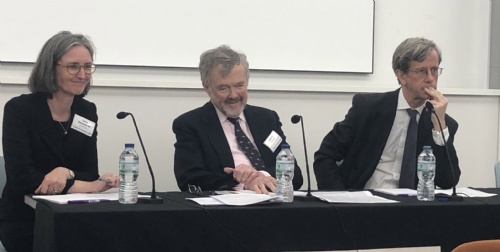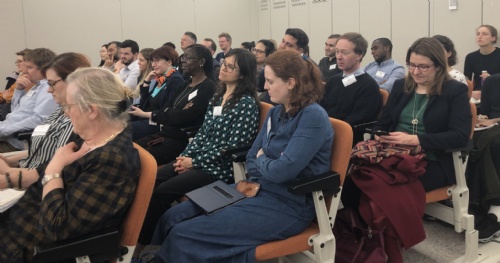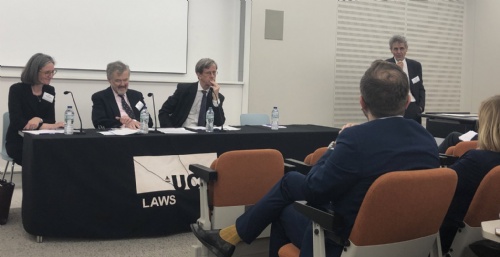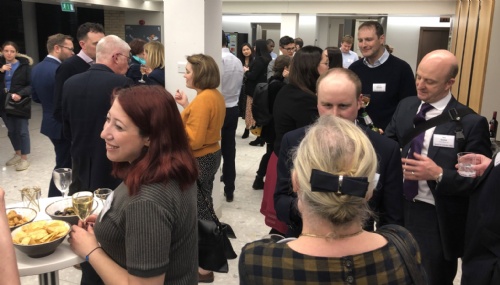Now in its twelfth year, Class 46 is dedicated to European trade mark law and practice. This weblog is written by a team of enthusiasts who want to spread the word and share their thoughts with others.
Click here subscribe for free.
Who we all are...
UK Judges Meeting focuses on Brexit and bad faith
The tenth annual “Question the Trade Mark Judges” meeting took place at University College London on the evening of 11 March.
 The judges taking part were: Lord Justice Arnold of the Court of Appeal, Appointed Person Emma Himsworth QC and Ian Forrester, formerly the UK judge on the EU General Court. The discussion was jointly hosted by MARQUES and the UCL Institute of Brand and Innovation Law (IBIL) and was moderated by Professor Sir Robin Jacob of IBIL.
The judges taking part were: Lord Justice Arnold of the Court of Appeal, Appointed Person Emma Himsworth QC and Ian Forrester, formerly the UK judge on the EU General Court. The discussion was jointly hosted by MARQUES and the UCL Institute of Brand and Innovation Law (IBIL) and was moderated by Professor Sir Robin Jacob of IBIL.
The discussion covered topics including how UK law might diverge from the EU after Brexit, assessing bad faith, appealing trade mark decisions, whether trade mark law is too complicated and the value of mediation.
Divergence
The first question was about the possibility of UK law diverging from that of the EU after Brexit. The speakers emphasised the political context and the uncertainty until the long-term relationship between the UK and EU is established. Even if the UK does want to change its IP laws, legislation would need to be drafted and parliamentary time would have to be found.
 As things stand, the European Union (Withdrawal) Act 2018 provides for continuity, in terms of EU directives and regulations, and only the UK Supreme Court can depart from CJEU case law to a limited extent. The Withdrawal Act 2020 confirms that this is the case until 31 December 2020, and also gives the government some additional powers to allow lower courts to depart from EU law.
As things stand, the European Union (Withdrawal) Act 2018 provides for continuity, in terms of EU directives and regulations, and only the UK Supreme Court can depart from CJEU case law to a limited extent. The Withdrawal Act 2020 confirms that this is the case until 31 December 2020, and also gives the government some additional powers to allow lower courts to depart from EU law.
In this context, as Lord Justice Arnold said, any legislative divergence in the short-to-medium term is unlikely. Over time, it is possible that courts will diverge from the CJEU, and two examples where there might be reason to diverge are the Mitsubishi judgment (Case C-129/17) and L’Oréal v Bellure (Case C-487/07). But even here any change would depend on an appropriate case arising and would take years to get to the Supreme Court.
Emma Himsworth also emphasised that the UK remains a member of international treaties and that there is unlikely to be much lobbying for change in the trade mark area, except possibly regarding exhaustion of rights.
The speakers agreed that in general the UK had benefitted from CJEU rulings. Lord Justice Arnold has referred 15 questions in the past 15 years and said the evolutionary “dialogue with the national courts” approach works well: “It means we get definitive answers on questions of EU law.” Emma Himsworth added that the discipline of appearing in Luxembourg is “a useful skill. We could learn from it.”
Bad faith
 Turning to the topical issue of bad faith, the panel agreed that it is arising more often in cases. Emma Himsworth stressed the value of disclosure and cross-examination, adding: “You usually know bad faith when you see it.” Ian Forrester said this was one area where British and Irish advocates made a big contribution to the General Court. He added that his understanding of the SkyKick judgment (Case C-371/18) was that bad faith would likely only be found in exceptional circumstances.
Turning to the topical issue of bad faith, the panel agreed that it is arising more often in cases. Emma Himsworth stressed the value of disclosure and cross-examination, adding: “You usually know bad faith when you see it.” Ian Forrester said this was one area where British and Irish advocates made a big contribution to the General Court. He added that his understanding of the SkyKick judgment (Case C-371/18) was that bad faith would likely only be found in exceptional circumstances.
The speakers argued that long specifications contribute to the problem, and that many parties were unable to provide sufficient evidence of use, often because they did not have records or staff turnover meant there was no collective memory.
Appeals
Ian Forrester provided some insight into the procedures at the General Court, point out that all the deliberations are in French and this creates a particular tone in judgments. In addition, the judgments are agreed by (normally) three or five judges and they are drafted to survive appeal. “Perhaps the General Court could focus more on important points and give less attention to less important or weak arguments,” he said.
Emma Himsworth noted that it is settled in the UK that decisions of an Appointed Person cannot be appealed. This means it is important that they address and resolve all the points raised, she said.
Too complicated?
 Is trade mark law becoming too complicated? Lord Justice Arnold said it was an “illusion” that it was ever straightforward, as the basic question “what is a trade mark?” has long been debated. However, new technologies and business models, as well as globalisation, have understandably made it even more challenging.
Is trade mark law becoming too complicated? Lord Justice Arnold said it was an “illusion” that it was ever straightforward, as the basic question “what is a trade mark?” has long been debated. However, new technologies and business models, as well as globalisation, have understandably made it even more challenging.
Ian Forrester added that at the General Court the situation is difficult because the Court has two heads of jurisdiction. “The Court is constantly trying to balance the review of legality and the review of fact and law,” he said. One advantage of trade mark cases in this respect is that the two lower instances in Alicante help to “clear the ground” meaning that when it reaches the General Court a case is “more digestible”.
Mediation
In light of the above challenges, the role of courts in promoting mediation was raised. The speakers broadly agreed that, while mediation can be very useful in trade mark cases and is to be encouraged in general, by the time a case has reached the High Court or Appointed Person level it is probably too late for the courts to influence.
There were a few questions from the audience, particularly concerning the possibility of divergence and the future role of the CJEU in the UK, followed by informal discussions over drinks.
About 70 people attended the meeting, which was the very last external event held at UCL before COVID-19 forced a general shutdown. The panel discussion was filmed, and the recording will be posted on the IBIL website soon. We will provide a link as soon as it is available.
Posted by: Blog Administrator @ 09.09Tags: IBIL, Meet the Judges, Brexit, SkyKick, Mitsubishi, Bellure,


 Sharing on Social Media? Use the link below...
Sharing on Social Media? Use the link below...Perm-A-Link: https://www.marques.org/blogs/class46?XID=BHA4839

